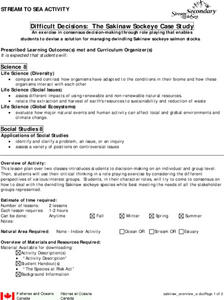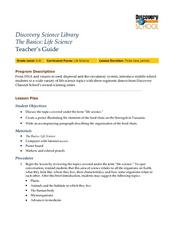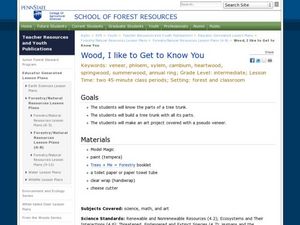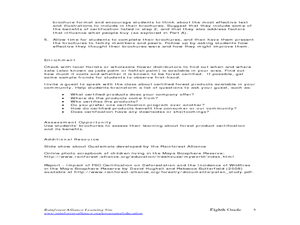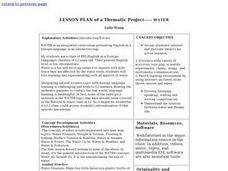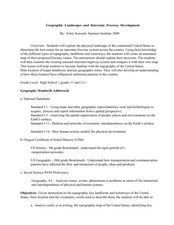Curated OER
Difficult Decisions: The Sakinaw Sockeye Case Study
Eighth graders examine Sakinaw Sockeye as species at risk, participate in role playing exercise to consider different perspectives of various interest groups, and try to come to consensus on how to deal with dwindling Sakinaw sockeye...
Curated OER
Labor Needs in Colonial America
Students examine the labor needs in colonial America. Using primary and secondary resources, they explore the major events and life in the United States during colonial times. They complete a chart listing the pros and cons of a slave...
Curated OER
What is Climate?
Learners explore the differences between climate and weather. For this introductory lesson of a climate unit, students discuss the vocabulary and concepts associated with weather and climate. They build their information base for the...
Curated OER
Stimulus Response
Students explore the five steps in the stimulus-response pathway. They analyze the senses and the difference between animals' primary and secondary senses. Students collect information about animal behavior to debate the ethics of...
Curated OER
Extensions - Biology Review Unit
Students engage in a variety of activities in order to review a Biology unit. For example, they research the Bird Flu, it's history, how it is spread, what has been done about it, what better options exist for controlling or removing it....
Curated OER
The Basics: Life Science
Students develop an understanding of the different fields of study that are encompassed by the term, life science. They view and discuss a video on the topic. In small groups they focus on on of the examples shown in the video to create...
Curated OER
Acids and Bases Are All Around
In this acids and bases worksheet, students read a 1 page article on acids and bases and answer 10 true or false, short answer, multiple choice and/or fill in the blank questions or statements referring back to the article.
Curated OER
Plant Parts
Students use "Kid Pix" to explore plants. In this science and technology lesson plan, students become familiar with plant parts and label them on a plant. Students tell the functions of each of the plant parts.
Curated OER
All The Seasons
Students explore winter, spring, summer, and fall. In this science and technology lesson plan, students use "Kid Pix" to draw pictures that represent the four seasons.
Curated OER
Shackleton's Antarctic Adventure
Young scholars research the exploration of Antarctica by the explorer Sir Ernest Shackelton. In this Antarctic exploration lesson, students watch a movie about Sir Ernest Shackelton and his ship the Endurance. Young scholars study a map...
Curated OER
Is that Tree Safe?
Students examine the parts of the tree and examine the health of trees in the vicinity. In this tree safety lesson students work in groups to complete a stated goal.
Curated OER
Wood, I Like to Get to Know You
Students examine trees. In this tree lesson, students create a model of a tree and its parts.
Curated OER
Where We Come From - A Culturally Responsive Writing Lesson
Students create a group poem. In this poetry lesson, students make a cultural poem titled "We Come From." They share their poems using the document camera and SMARTboard.
Curated OER
Protecting the Guatemalan Rainforest through Certification
Eighth graders examine criteria that may be involved in forest certification. For this rainforest lesson students create a brochure to educate people on the benefits of buying certified forest products.
Curated OER
Arthur's Tooth
Students practice their reading comprehension by reading a story in their class. In this story map lesson, students read the Marc Brown book Arthur's Tooth and discuss the story, characters and setting. Students create a story map based...
Curated OER
Phases of the Moon: Cooperative Learning
Third graders examine the phases of the moon. In this moon phase lesson, 3rd graders listen to a read aloud of The Moon Seems to Change by Franklyn M. Branley and discuss the phases of the moon. They complete a moon phase calendar and...
Curated OER
Lesson Plan of a Thematic Project - Water
Sixth graders investigate the properties of water. In this life science instructional activity, 6th graders create a concept map of water. They share their work with the class.
Curated OER
Global Warming – More or Less
Eighth graders identify the factors that contribute to global warming. In this earth science lesson, 8th graders evaluate the impact of global warming on the planet. They discuss their views within the group.
Curated OER
Making a Food Web and Learning About Ecosystems
Third graders examine the difference between a food web and food chain. They also examine the importance of the sun in a food web and food chain. Students understand what happens when you remove parts of the chain.
Curated OER
Comparing Northwest Native American Communities
Students review how to use the database from previous lessons. Using the information, they identify the historical and environmental effects on the people living in the Pacific Northwest. They examine the various Native American groups...
Curated OER
Site vs. Situation: Location! Location! Location!
Students examine places with a similar latitude to Alabama, and discuss the importance of a location's site versus its situation. They analyze maps, create a chart, and write a paragraph on the difference between site and situation.
Curated OER
Regions: Meet the Experts Presentation
Students gather information and create a web site on prairies and plains using a variety of resources, including the internet.
Curated OER
Geographic Landscapes and Interstate Freeway Development
Students investigate the topography of the United States through a discovery lesson. They create a hypothetical route for a highway across the United States. Students also conduct research major landforms and define geographic terms.
Curated OER
Outcomes Science 4: Earth & Beyond
In this earth and beyond science worksheet, students read through 11 pages of information on weather, global warming, climate change and other related topics. There are many website links on the pages that provide additional information...


